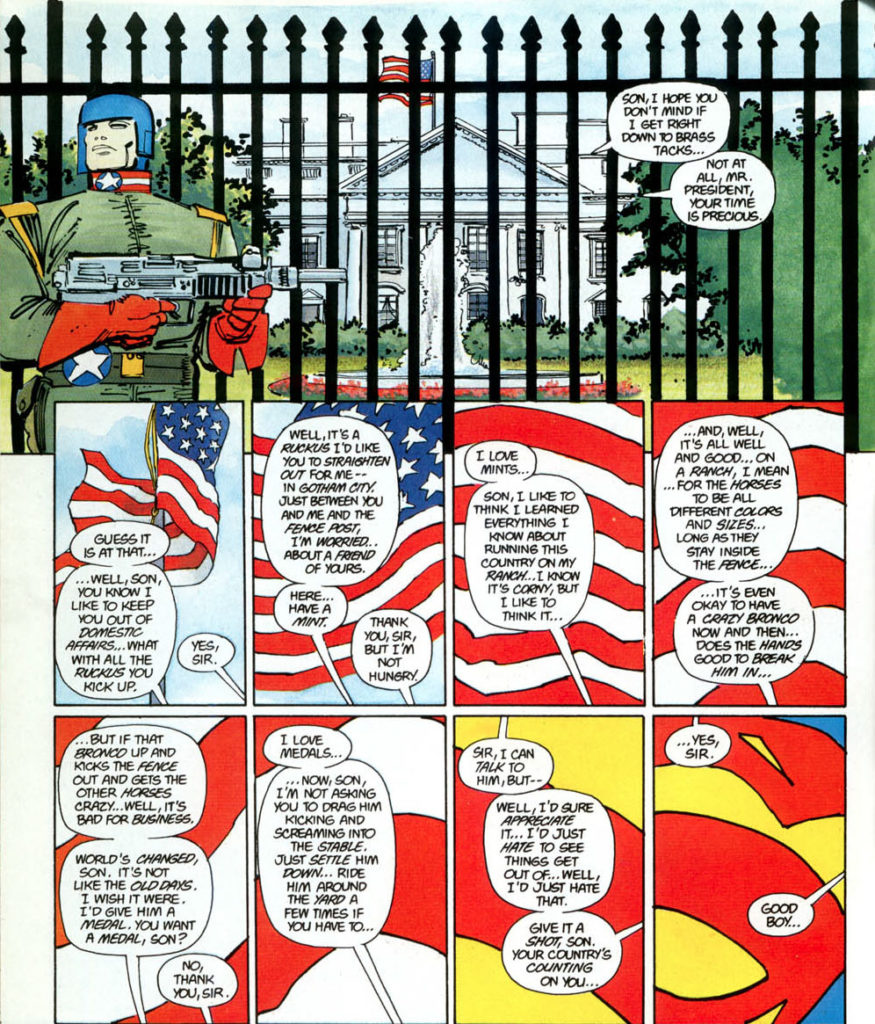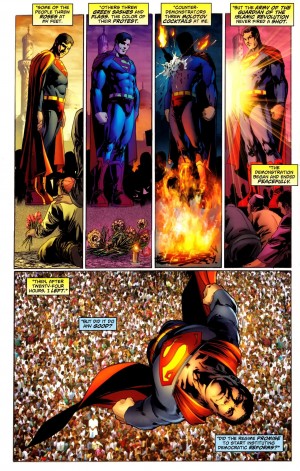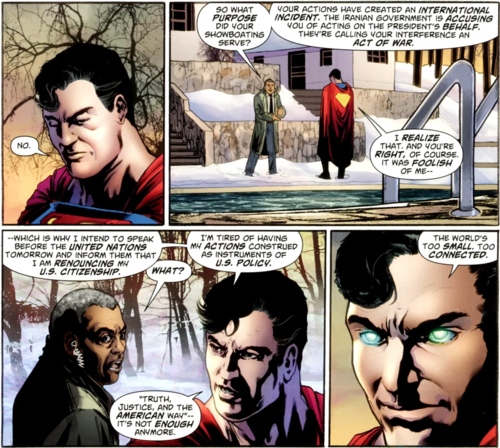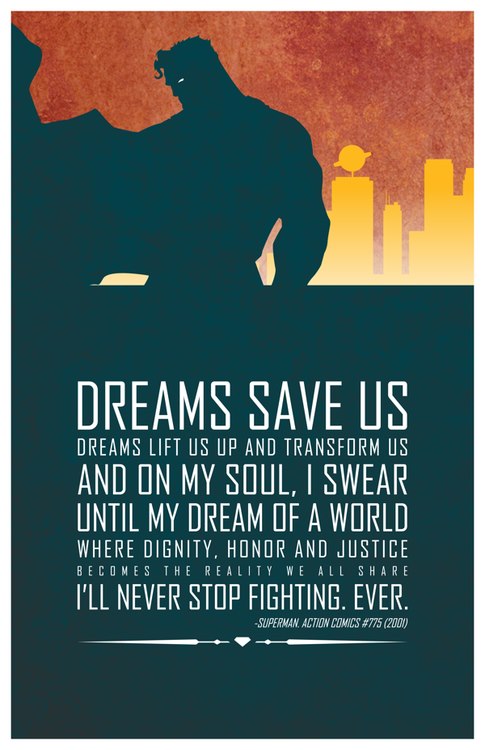With this post we begin our two weeks of daily coverage of Superman, similar to what we’ve recently done with Star Trek and James Bond, counting down to the release of Man of Steel. When I first talked to the bots about doing this, one of them who shall remain nameless (Scarlett Robotica) actually asked, “What would you cover?” What couldn’t we cover? Literally, Supes is one of the few characters who we could write something about his history every day for a year and never run out of material. The only other characters in geekdom who come close to that are Batman and maybe Spider-Man.
He’s literally everywhere, with Superman iconography being more or as recognizable in many parts of the world than Jesus or Elvis or Mickey Mouse. With five feature films, (which we’ll cover each in depth), to hundreds of hours of television, animated series, animated films, parodies, music, and, of course, the thing that started it all: comic books, there is far too much to cover. We’ll try to cram as much as possible into the next two weeks, but we just won’t be able to get to all of it. (Sorry, no review of Lois and Clark: The New Adventures of Superman or Superfriends, but we will do Smallville and will cover the early Superman serials. I’ll try to squeeze in something about my favorite episodes of Justice League, but no promises.)
But before we get to that, I had to write something personal. Why Superman? Does he matter? Is he relevant? Well, let me try an experiment:
Look! Up in the sky! It’s a bird! It’s a plane! It’s. . .
Most likely you know the end of that little ditty. You probably can also fill in this Mad Lib easily:
Faster than a ___________. Stronger than a _______________. Able to leap _________ in a single bound. (speeding bullet, locomotive, and tall buildings, if you’re playing along at home)
2013 marks the 75th anniversary of when Jerry Siegel and Joe Schuster, a young writer and artist respectively, children of Jewish immigrants who met going to high school together in Cleveland, published the story of a Superman in Action Comics #1. An immigrant like their families, he embodied all of the spirit of America that he’d learned from growing up on a farm in the US heartland. He was the first, and remains possibly the most, iconic superhero in a genre now replete with super people of all kinds. So reason number one I love Superman is because I understand that without him, there would be no X-Men, no Spider-Man, no Cable and Deadpool, no Watchmen.
Let me admit up front: as you can see from the titles I just named, I was always more of a Marvel than a DC. So why do I lionize the Last Son of Krypton? Because even though I’ve never been a regular reader of any of the Superman or Action Comics (I much prefer his appearances in stand-alone series like Kingdom Come or Earth One) — I love the character. I love him for who he is, what he represents, and everything he could be and ever will be. He is essentially American Space Jesus, combining three things that I love.
And that is the crux of why I love Supes. He is, basically, all-powerful. And yet somehow he remains incorruptible, completely defying the aphorism that Power corrupts, and Absolute Power corrupts absolutely.
I mentioned Watchmen earlier, and with good reason. Not only did Allan Moore also write some of my favorite Superman comics of all time (“For the Man Who Has Everything,” “Whatever Happened to the Man of Tomorrow?”) but you have to see Moore’s concurrent work on Watchmen and especially the character of Dr. Manhattan as being a commentary on Superman. “God exists, and he is American.”
The idea of “Who watches the watchmen?” or “Quis custodiet ipsos custodes?” is not only central to Watchmen, but also to political philosophy dating back to Plato’s The Republic, that, in fact, being one of the central questions posed by Socrates. Plato’s ideal of having a city based on Justice, ruled over by Philosopher Kings who are equally physically strong as they are morally educated, serves as an almost template for, in some iterations at least, Jor-El’s original intention in sending his son to Earth. Meanwhile, Dr. Manhattan also fits this profile, but he is aloof, bored, and not only a dispassionate disinterested party to mankind’s doings (and therefore a fair arbiter), but un-passionate, and un-interested– and therefore a poor guardian. Superman, however, is somehow able to stay grounded in humanity.
In fact, unlike Dr. Manhattan who almost seems not to bother with Sally Jupiter or his compatriots like Drysdale and Rorshach, Superman has bonds with people. This list almost begins and ends with Lois Lane, the one who truly keeps Superman “grounded,” who helps keep him human. But there’s also Ma and Pa Kent and Jimmy Olsen who keep Big Blue tethered to terra firma.
But Superman also works best against a foil, and there is none better for the indestructible alien Kal-El than the little boy with no superpowers who swore to stand up for justice after the murder of his parents — Batman. In one sense, you have two sides of the Nietzsche-ian concept of the Ubermensch (Superior Man) — one who is inherently powerful and therefore above the law because he inherently surpasses it, and one who through struggle and skill has made himself above the law as a vigilante. Neither has to be bounded by society’s rules– by virtue of their superiority they could choose to simply do whatever they wished. But they don’t, and that is what makes them heroes. Meanwhile, their rogues’ gallery is full of people who are also Ubermensch, but who choose to use that power for their own selfish and/or deranged ends.
The fact that Bruce and Clark know each others’ secret identies is also illuminating, helping to keep a check on Superman”s potentially galaxy-sized ego. A lot of Superman purists may disagree and hate the “Big Blue Boy Scout” portrayal in Frank Miller’s scathing and seminal “The Dark Knight Returns” but I love it. Because it displays one of Superman’s only flaws: his naivete, his willingness to follow orders because of misplaced patriotic duty.
The similar showdown between Batman and Superman in Red Son is also important, and something Swankmotron and I will cover in more detail in the coming weeks as part of our extensive Superman coverage.
But it’s this same patriotism that also makes Superman so great and so interesting. Superman recently created a splash when he renounced his US citizenship. After going to Iran to stand as a shield between a protest and the government forces who had begun to crack down on the nascent pro-democracy movement, he proclaimed, well, just read:
“Truth, Justice, and the American Way”– It’s not enough anymore. The world’s too small, too connected.
Indeed, Superman, indeed. While this was wildly misinterpreted by Fox “News” and their ilk, the real point here is that while these ideals may have at one time been uniquely American, while Superman may have been uniquely American, they are now worldwide. Now he belongs to everyone. It is that take on American patriotism, on American exceptionalism, that are refreshing and even more important today.
Superman’s optimism, his unwavering moral compass, his complete lack of cynicism, snark, or any other pretense or irony that is so endemic in today’s culture is so odd, so old-fashioned, that Superman can certainly get a bad rap. He’s a relic, a symbol of a bygone era, critics complain.
Lois Lane: So how did you enjoy your first day on the job?
Clark Kent: Frankly, the hours were somewhat longer than I expected, but meeting you and Jimmy and Mr. White on the whole I think… it’s just… swell.
Lois Lane: Swell? You know, Clark, there are very few people left in the world these days who sound comfortable saying that word.
Clark Kent: What word?
Lois Lane: “Swell.”
Clark Kent: Really? It just sort of comes naturally to me.
—Superman (1978)
And maybe it is a little old fashioned, but, as Agent Coulsen told Captain America in The Avengers last year, “With everything that’s happening, the things that are about to come to light, people might just need a little old-fashioned.” Nothing cuts through today’s treacle, where everything has to be ironic or critical, like a little old-fashioned Superman truth, justice, and the American way.
But don’t get me wrong. One of the best things we’ve heard ever about Superman in the last 75 years of his existence, has come from the master of post-modern banter and cynical cool himself, Quentin Tarantino:
“>httpv://www.youtube.com/watch?v=eWTJIBGNId0
And just because he’s critical of Superman, doesn’t mean I can’t both agree with him and still love Superman regardless.
But most of all and finally, Superman gives me hope. We latch on to him as an archetype because we crave that nobility, that moral certitude, and maybe that absolute power and the ability to keep it from corrupting us. I would hope that if given the powers of Superman I could be as noble, as giving, as he is. Human nature tells me otherwise. I’d probably occasionally get mad at someone and sock them in the jaw, putting them in the hospital or worse. I’d probably go on a terrible spree of vengeance destruction, blowing up pipelines and factories belonging to evil corporations, destroying the ability of ruthless dictators to make war, and in my attempt to do good, I’d probably do a lot of evil myself. Because I know that this kind of power is too much to be entrusted to anyone but one of the Ubermensch.
But if Superman can do it, maybe so can I.
I leave with two poignant takes on the Man of Tomorrow. The first as a preview for my future article of “Songs about Superman.” This sums up my feelings pretty well, and also rhymes the name of Solomon Grundy (and not with “born on a Monday”) And lastly a beautiful image telling us our dreams of a better world will save us.
httpv://www.youtube.com/watch?v=ihUIPlLw2ZE
Tarzan wasn’t a ladies’ man.
He’d just come along and scoop ’em up under his arm like that, quick as a cat in the jungle
But Clark Kent, now there was a real gent
He would not be caught sittin’ around in no junglescape, dumb as an ape doing nothing
Superman never made any money saving the world from Solomon Grundy
And sometimes I despair the world will never see another man like him
Hey Bob, Supe had a straight job
Even though he could have smashed through any bank in the United States, he had the strength, but he would not
Folks said his family were all dead
Their planet crumbled but Superman, he forced himself to carry on, forget Krypton, and keep going
Superman never made any money saving the world from Solomon Grundy
And sometimes I despair the world will never see another man like him
Tarzan was king of the jungle and Lord over all the apes
But he could hardly string together four words: “I Tarzan, You Jane.”
Sometimes when Supes was stopping crimes
I’ll bet that he was tempted to just quit and turn his back on man, join Tarzan in the forest
But he stayed in the city, and kept on changing clothes
In dirty old phonebooths till his work was through and nothing to do but go on home
Superman never made any money saving the world from Solomon Grundy
And sometimes I despair the world will never see another man like him



